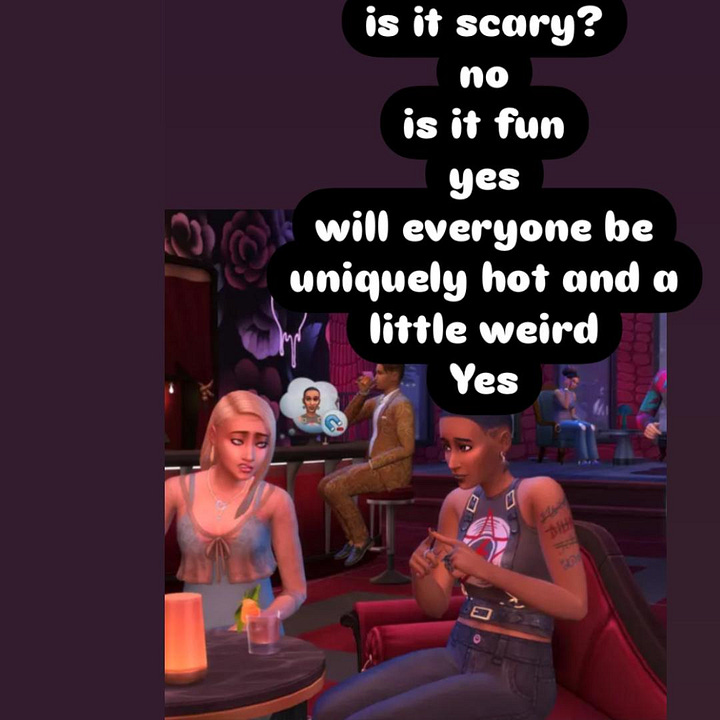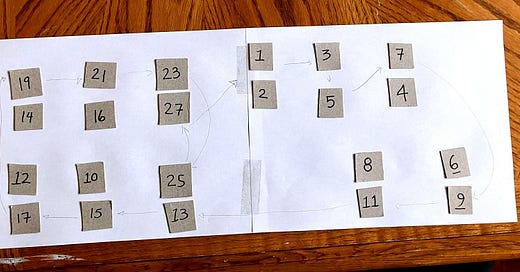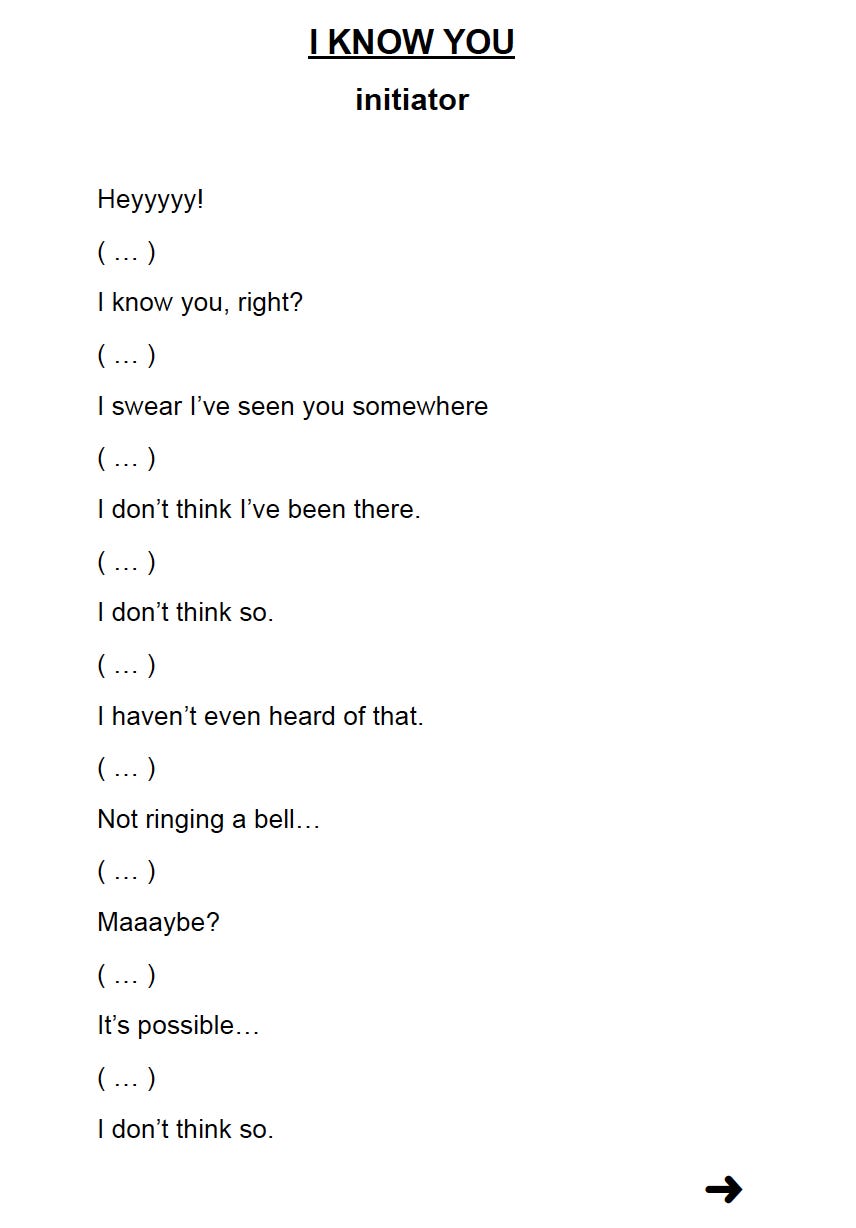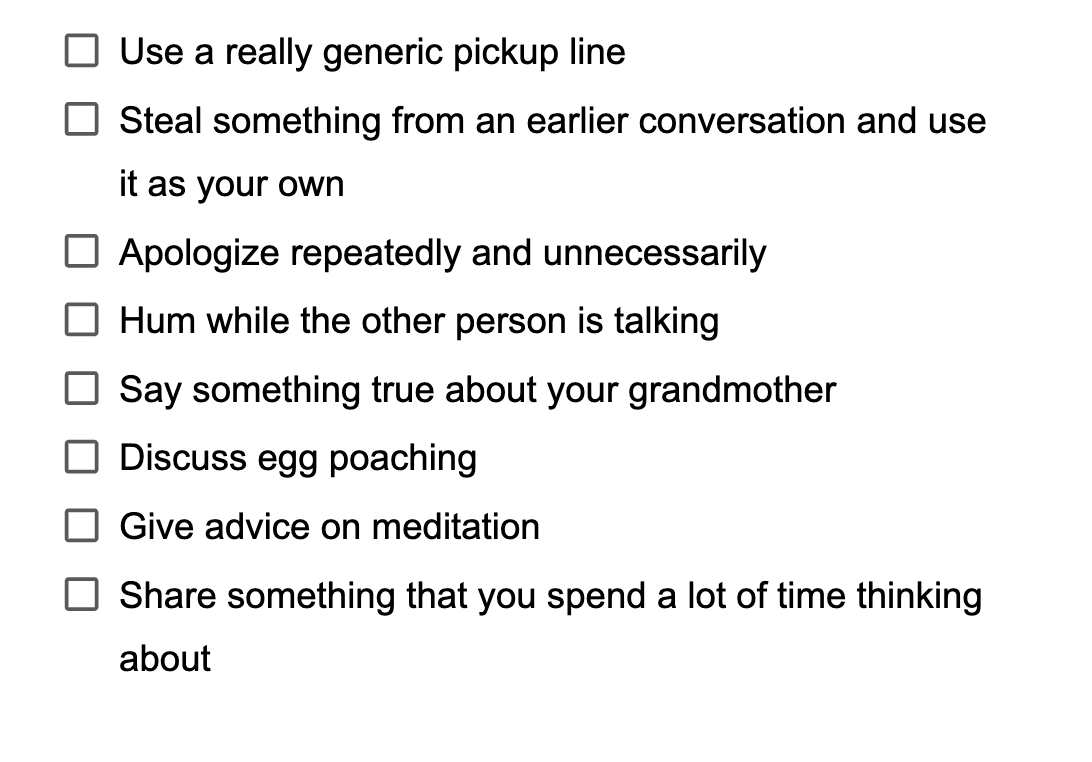No.
I figured I’d go ahead and just answer the question right up front, in case a quick answer is what you’re looking for. (Ha ha — I can’t possibly imagine a single question for which someone would seek out this substack — or me, as a person — for a “quick answer.”) Speed dating is not theater.
Okay,
you say,
but from whence does this random and seemingly rhetorical question come?
If you follow me on social media or ever talk to me, you probably know that I’ve recently begun running speed dating events. You know this because my usually-quiet instagram account has been overrun with aggressive, Sims-themed marketing, and because I’ve been monologuing about this in every social setting until my partner gently taps his wrist to say “wrap it up.”
And yet, the other day when a regular at the bar, who had been watching me host one of these events, told me it was cool to see me “in my element,” I was horrified. My element! Is this who you think I am? A glorified-game-show-host-slash-amateur-love-guru?!? You think this is the deepest expression of my soul?!
I’m sure she meant well. In fact, it was probably a nice compliment. She was saying I seem good at this. But this compliment-slash-accusation, combined with the fact that I’d neglected my writing for at least a week to obsess over prompts and seating charts and sign-ups for speed dating, made me uneasy. And now that we’re putting more dates on the calendar for summer, meaning what started on a whim is becoming something I’m committing regular time and energy to, I’m feeling the need for more clarity on what life bucket this goes in. Is it a side hustle slash money making venture? Is it an elaborate hobby? Or do I consider it to be, in some way, included under the umbrella of “my work”?


You all know that one of my core themes is, “what are people in theatre actually doing, and what might we be doing instead?” Which is not to say, “how do we get out of the theater,” but rather, what is at the center of my devotion to this form that is not thriving culturally, institutionally or financially? How might I stay true to that devotion in ways that are more accessible, more easily funded, etc, etc?
One of my answers — one of my devotions, that keeps me circling back to theater — is a love for art that requires gathering. Without this devotion, my writing aspirations could easily have shifted towards tv, film, fiction — forms that are equally difficult to succeed in, but that continue to have more of a foothold in our cultural fabric. It turns out, though, that when you’re doing something as impractical and unlikely to succeed as being a writer, it really does come down to what you feel a need for, what you’re willing to spend your life force on. For me the gathering piece has always been significant, as well as a deep desire to create things that exist in opposition to our increasingly digital lives.
I’ve been saying all this for years, but for the most part what I have continued to make is theater, in theaters, with actors. So when this speed dating opportunity arose, I thought, why not try working from the other direction, and see what I learn? Why not run an event that’s not theater, that is more about the gathering part, about moving something we do digitally back IRL? It happened because my bosses were looking for programming to bring in clientele on slow nights, and I mentioned I’d always thought speed dating sounded fun. I also had a notion that this type of event could be a test run that, if successful, could open the door to me programming more arty or writing-related stuff in the space in the future.
I’ve attended exactly one speed dating event in my life, and what I remember is feeling awkward and ultimately bored by having the same 4-minute conversation a couple dozen times. “Hi, how are you? What brings you here tonight?” “So what do you do?” “Is this your first time speed dating?” Etcetera. Obviously my solution to this was to lightly script my attendee’s interactions. For the first section of our event, participants were given one half of a dialogue that they read with their partner, filling in the gaps mad-lib style. They were instructed to go in loose and easy, not try to perform or be clever, and to wait every time they see a “( … )” for their partner to speak. For example, one person would have this side of the dialogue:
while the other person would have this:
The dialogue generally ended a little before the timer to switch partners rang, leaving folks to continue the conversation on their own, and maybe or maybe not figure out why their partner just suggested they might know each other from Chuck E. Cheese.
After the scripted convos, participants cycled through a series of silent matches, where they are instructed to pass notes, draw pictures for each other, maintain eye contact while doing various activities, etc. Then, in the final stretch of matches, people were tasked with working through a conversational checklist that included items such as:
The most obvious measure of whether these events are successful is whether there are matches. (Each person turns in a sheet where they’ve marked who they’re interested in, and if two people express mutual interest we sent them each other’s contact info.) For me, though, a much more satisfying metric has been how many people end up hanging out together at the bar afterwards — not necessarily because they’re interested in each other romantically, but because they just had a shared experience that has inspired conversation. After the most recent event, one group flagged me down to settle a debate about egg poaching, which some had interpreted as a cooking method and others had interpreted as illegal collection of rare eggs. Hearing their conversation gave me a little thrill — it reminded me of eavesdropping on people after they’ve seen one of my plays, that feeling of having taken people on a ride and dropped them off somewhere they otherwise wouldn’t have landed. Then it made me sad, because the ride I want to be taking people on is not about egg poaching.
I don’t think speed dating is “my work.” But I do think it’s a useful step on the road to somewhere new in my work. Somewhere perhaps less institutionally bound and more open to where my devotions take me. Now that I’ve figured out the basic formula, I’m interested in exploring the bounds of what can happen inside it. Which prompts are most consistently leading to buy-in, and once participants are bought in, where can we go? What are the limits of vulnerability or strangeness that can happen in a bar setting with music playing in the background? At what point am I pushing my art agenda when people are really just looking for someone to hook up with? It’s fun to be on a different timeline — once or twice a month til we’re sick of it or til it becomes something else — rather than the intense build up to a few-show run. It’s fun to see what Producer-Addie knows when she is not clouded by the vulnerability of producing something she has written that feels larval and fragile. For now, these benefits seem reason enough to facilitate at least a few more egg-based revelations.








Very interesting!
Thank YOU!